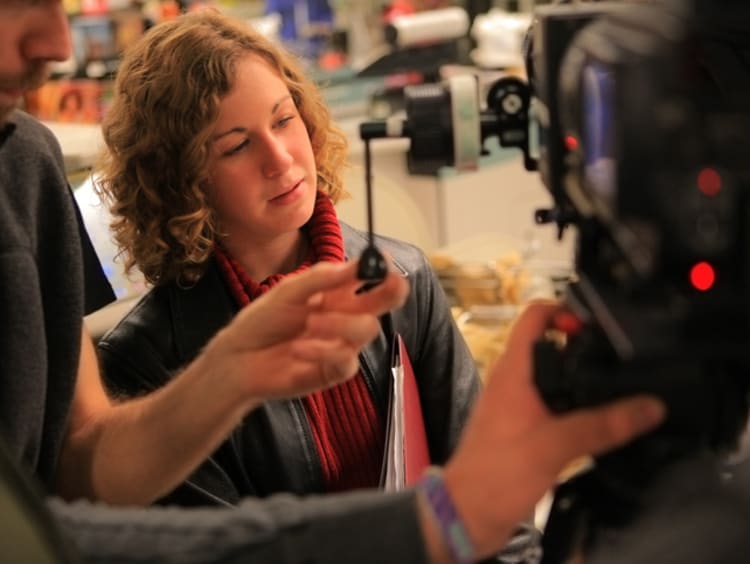What Is a Producer and How Can You Become One?

Have you ever watched a movie’s ending credits and wondered, “What is a producer and what do they do?” You’re certainly not alone! The film producer’s job is one of the least-understood positions in Hollywood, although movies and TV shows couldn’t be created without these hard-working professionals.
The simple explanation is that producers are responsible for shepherding a creative project through its entire lifecycle—from conception to release. Whereas a director largely handles the creative decisions of the project, producers are responsible for the financial and business-related decisions. If you’d like to work behind the scenes on creative projects that countless people may enjoy, read through this career guide. It will help you understand the realm of film production, including the process of becoming a producer.
What Is a Producer?
A producer works on the development, planning, execution, release and marketing of a creative project. Producers can work on movies, TV shows, reality shows, animated shows, commercials and theater productions. Usually, a producer will specialize in one or two types of creative projects, such as TV shows and movies.
Some producers are self-employed contractors who may work with a range of different production companies. Others work directly for a studio or production company. Producers who specialize in TV commercials may be employed by a marketing agency.
A producer’s daily responsibilities depend on the particular stage of the project they are managing. During development and preproduction, a producer may:
- Identify projects that look promising, both in terms of artistry and commercial viability
- Purchase the rights to creative projects and secure financing from investors
- Assemble a creative team of writers, managers, talent (actors for the leading roles), critical crew members and a director
- Liaise with the production company to “green light” the project (obtain approval to move forward with it)
During the production phase, the producer is responsible for establishing a budget and ensuring that the project stays within that budget. They will use production management software to develop a production schedule and will work to keep the project on track for completion by the deadline. Other common production phase tasks include:
- Working with the director to hire other important creative staff members, such as the cinematographer, casting agents and production designer
- Overseeing and managing the logistics and business operations
- Supervising the production of the film
Although the director is in charge of the creative aspects of the project, the roles of director and producer can sometimes overlap. The director and producer may collaborate on major creative decisions and the director may sometimes need to get the producer’s approval on them. For instance, if the original screenplay isn’t working well and needs to be rewritten, the producer may need to approve a rewrite because it will involve additional expenses that may jeopardize the established budget.
A producer’s work doesn’t end after shooting wraps up. Producers oversee the post-production process, including the editing and music composition. As the project nears its release date and post-production concludes, the producer will work with a public relations (PR) team to generate public interest in the film.
How To Become a Producer: An Overview
Now that you know what a producer is, you may have decided that you’d love to pursue this career. If you’re still in high school, you should discuss your career plans with your guidance counselor. A guidance counselor may be able to help you adjust your course load to focus on classes that will be useful for becoming a producer.
A few types of classes will be ideal for you, including:
- Social science classes (e.g., psychology)
- Humanities classes
- Computer applications
- Entrepreneurship
- Business law
- Microeconomics
Consider joining a drama club or a digital film club during your high school years. You might also look for opportunities at a community theater organization during the summer.
You’ll need to earn a bachelor’s degree, as producers are generally expected to have an undergraduate education. After graduation, you’ll need to acquire an entry-level job in the industry. Gaining professional work experience may enable you to work your way up the ladder and eventually pursue the role of a producer.
Earning Your Film Degree
After high school, the first step in the process of becoming a producer is to earn a bachelor’s degree. Most aspiring producers choose to earn degrees in film or cinema studies. It’s also possible to pursue this career path with a degree in theater, communications or a similar artistic field.
However, some schools may offer more specialized degree programs for aspiring production professionals. One such option is the Bachelor of Arts in Digital Film with an Emphasis in Production degree. This type of degree is ideally suited to students who would like to become producers as it explores both the creative, behind-the-camera aspects and the business side of filmmaking.
The curriculum for such programs will vary from one school to the next. In general, however, students may expect to study topics such as:
- The lifecycle of a film project from development and pre-production to post-production and release
- Techniques to implement in music videos and documentary productions
- Advanced digital editing tools, techniques and approaches
- The expression of creative messages through small-format digital production
- Audio production skills, including 21st-century challenges and how to solve them
Your degree program may include a practicum course during your senior year. You’ll likely be required to create a short digital film. This will prove invaluable not only as a chance to practice your skills and exercise your creativity but also as an addition to your professional portfolio.
Film and production students are strongly encouraged to explore internship opportunities while in college. Being a producer is not an entry-level job. Thus, students who can demonstrate some work experience on graduation may be better positioned to pursue this role sooner. You can look for internship opportunities at local community theaters, film production companies and even marketing agencies that create television commercials.
Landing an Entry-Level Position
As in most workplaces, there is a clear hierarchy on professional film sets. Students who aspire to become producers, directors or other major players on creative projects must first pursue an entry-level position. First, you’ll want to look for internship and apprenticeship roles, as well as assistant positions.
Some examples of entry-level positions include:
- Assistant producer
- Production assistant
- Assistant editor
- Assistant camera operator
- Boom operator/sound trainee
Are Film Production Professionals in Demand?
Although it shouldn’t be the sole factor to consider when determining your future career, it’s always smart to consider the job prospects for the careers you’re considering. You’ll be pleased to know that qualified film production professionals are in high demand.1
This job growth is partially attributable to the steadily increasing number of TV shows being aired on online streaming services and other online platforms. Job growth is expected to be slower for producers and directors who work in small and mid-size theaters. However, the job prospects associated with larger, well-funded theaters in major markets such as New York City and Los Angeles are expected to be more robust.
If you aspire to pursue a job in Hollywood, you can develop a solid foundation for success at Grand Canyon University. The College of Arts and Media is pleased to offer the Bachelor of Arts in Digital Film with an Emphasis in Production degree program to students who value creativity, storytelling and the technical aspects of filmmaking. Click on Request Info at the top of your screen and take the first step toward joining the dynamic and supportive learning community in the College of Arts and Media at GCU.
1Retrieved from U.S. Bureau of Labor Statistics, Occupational Outlook Handbook, Producers and Directors in January 2022.
The views and opinions expressed in this article are those of the author’s and do not necessarily reflect the official policy or position of Grand Canyon University. Any sources cited were accurate as of the publish date.


